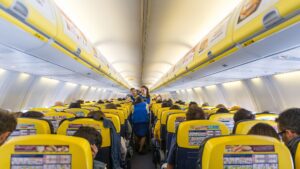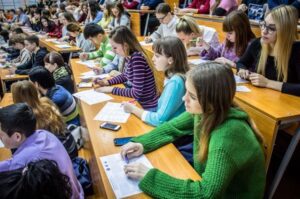
The Irish low-cost airline Ryanair launches flights from Lviv to Paphos (Cyprus) as part of the summer schedule since July.
This flight will be operated twice a week, the press service of the airline said on Thursday evening.
At the same time, due to regular changes in restrictions in connection with COVID-19, customers can postpone or change travel dates up to two times with zero commission until the end of October 2021, Sales and Marketing Manager for Central and Eastern Europe and the Balkans at Ryanair Olga Pawlonka is quoted as saying in the press release.
There are currently no direct flights in this direction.

From May, 1 till May, 4in Ancient Kyiv in the Principality of Kyivan Rus («Kyivan Rus Park») Easter with the consecration of dishes and a bright rest will take place. In an ecologically clean area, on fresh air, on a territory of over 20 ha the guests will be awaited by horse rides and competitions, amusements, tasty dishes from a bonfire and the acquaintance with horses of rare historical breeds.
On Easter, May, 2 it will be possible to consecrate dishes in the unique reconstructed wooden temple of the Х century. A solemn procession will be organized to the Basyl`s church which will end with a festive Easter prayer. The priest will consecrate the Easter baskets of all the guests in the yard of the church. It will be possible to order hot shashliks, medieval dishes and drinks right on place. You can also take baskets from home with you.
On May, 1, 2, 3 and 4 the festive program will begin with the solemn greeting of the Great Prince of Kyiv Volodymyr with treats and surprises. Princess Spring will charm the guests with fiery songs performed live. After all the guests will be invited to take part in the solemn procession to the unique reconstructed Basyl`s church of the Х century.
The festive program will continue with horse performances, trick riding elements, and also the unique «Princely hunt» performance from the actors of the horse-trick theatre of Ancient Kyiv with the use of different medieval weapon.
The costume tournament of horseback archers will be the holiday gift for the guests. During these days the strongest sportsmen-virtuosos will come to the Principality in order to compete in the traditional (historical) bow shooting accuracy on a horseback at full gallop. This is an incredibly difficult task for the competition participants, but at the same time an excitable and thrilling spectacle for the viewers!
The competition between the participants will be fierce, as the tournament winners will get the chance to take part in the «Scythians» Open horseback archery championship of Ukraine, which will take place in Ancient Kyiv on May, 15-16.
The guests will not only watch the action on the Big tilting-yard. All the willing ones will have a chance to test their force and dexterity by taking part in master-classes.
During May, 1 – 4 all the guests of Ancient Kyiv will be awaited by a kaleidoscope of bright emotions in a real live medieval city, which will then continue on May, 8, 9 and 10.
The acquaintance with the unique horses of rare historical breeds, gathered from all over the world in the Princely stable, will be waiting for the guests. The representatives of some breeds can be found nowhere else in Ukraine as they were brought to our country in a single number. Experienced instructors-horse-breeders will tell about the origin of the breeds and their features. Every visitor will get a chance to approach the horses, palm them, take a photo with and even have a ride on a horseback or in a carriage.
In Ancient Kyiv everyone will find an activity at his liking. Here you can shoot a bow and toss knives in the medieval shooting range, fly on the «Politaylo» rope descent and the «Zmiy Gorynych» speed slide, visit the Fortune-teller, dress into historical costumes of the Kyivan Rus times and make a photo session in them. In medieval stores it will be possible to choose original hand-made souvenirs for memory and to learn new on medieval master-classes.
On the Medieval cuisine you can taste delicious drinks and dishes prepared on bonfires both according to ancient and modern recipes.
If you wish to prolongate your travel to the Middle Ages for one more day you can stay for the night in comfortable rooms (by previous booking).
Ancient Kyiv opens at 10:00, the beginning of the program at 13:30.
The program may change.
The visit of Ancient Kyiv is subject to the quarantine regime requirements.
Ancient Kyiv is in a 45-minutes’ drive from modern Kyiv – in the Kyiv region, Obukhiv district, vill. Kopachiv.
You can get by your own car or by public transport. The schedule of route taxis check on the «Obukhivtrans» website or on the «Kyivan Rus Park» website in the «Contacts» section.
The cost of entrance tickets:
– A full adult ticket:
– On May, 1, 3 and 4 – 230 Uah.
– On May, 2 – 250 Uah.
– for pensioners and students – 150 Uah.,
– for schoolchildren – 80 Uah.,
– for preschool children – for free.
Detailed information on the website: parkkyivrus.com
The Interfax subscribers can save money with the “openbusiness-20” promo code for a 20%-discount for a full price adult ticket to the Principality of Kyivan Rus:
– by previous order by tel.: +38 044 461-99-37, +38 050 385-20-35
– or at the cash desk at the entrance to the «Kyivan Rus Park».

Private higher educational institutions will be able to train specialists on state orders, according to the Ministry of Education and Science of Ukraine.
“For the first time, private higher education institutions will be able to train junior bachelors and bachelors on state order. Such institutions will have access to the ‘State Order’ module of the Unified State Base for Education if they submit an application to the Ministry of Education and Science by May 24, 2021,” the press service of the department said.
The report says that in case of opening access to the Unified State Base for Education and obtaining places of state order, the educational institution will have to comply with the legislation on indicative costs at all levels, specialties and forms of obtaining higher education.
National bank of Ukraine’s official rates as of 30/04/21

Source: National Bank of Ukraine

Another batch of CoronaVac coronavirus vaccine produced by the Chinese company Sinovac Life Sciences in the amount of 500,000 doses will arrive in Ukraine on Friday, April 30, Minister of Health of Ukraine Maksym Stepanov said.
“Sinovac has just confirmed to us the next delivery of CoronaVac vaccine. Tomorrow evening, 500,000 doses from our contract for 1.9 million doses will arrive in Kyiv,” Stepanov wrote on his Facebook page on Thursday evening.
Previously Stepanov said: “We expect Pfizer from two sources. The first is COVAX – 473,000 doses. We have received the official confirmation from COVAX that this will happen in the timeframe from May 17 to May 18. Also in May, we expect to get also about 500,000 doses under a direct contract from Pfizer. It will be used according to the vaccination plan in the categories of risk groups for people who are over 60 years old, or people who have concomitant diseases,” said Stepanov on the air of the Nash TV channel on Tuesday.
The minister also said when to wait for a new delivery of the Chinese vaccine CoronaVac. “By the way, today we have received confirmation, including from the Chinese Ambassador to Ukraine, that the next 500,000 doses of the vaccine should arrive in Ukraine by April 30,” Stepanov said.